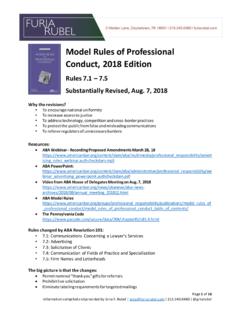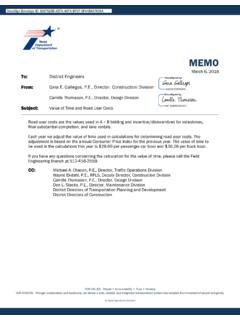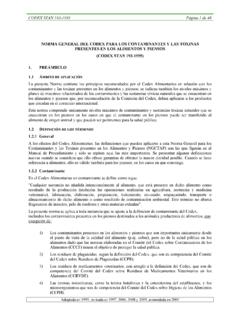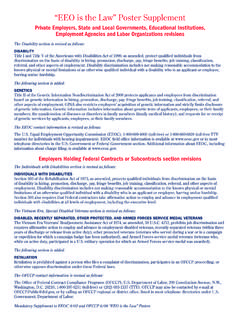Transcription of UNDERSTANDING GINA, THE GENETIC INFORMATION ...
1 GINA & YouUNDERSTANDING GINA, THE GENETIC INFORMATION nondiscrimination ACT OF 2008 What is GINA? The GENETIC INFORMATION nondiscrimination Act of 2008 (GINA) is a federal law that protects people from GENETIC discrimination in health insurance and employment. GENETIC discrimination is the misuse of GENETIC INFORMATION . What is GENETIC INFORMATION ? GENETIC INFORMATION helps you know and understand health conditions that run in your family, as well as your risk for developing certain health conditions, or having a child with certain conditions. Why is GENETIC INFORMATION important to me?This INFORMATION can help you make healthy lifestyle choices and important life and medical decisions. With GINA s protections, you can feel more comfortable talking about family health history with your family and healthcare providers. You may choose to use GENETIC testing and other services to learn about health risks without fear of GENETIC are GINA s protections in health insurance?
2 It is against the law for health insurers to request, require, or use GENETIC INFORMATION to make decisions about:s9 OURELIGIBILITYFORHEALTHINSURANCEs9 OURHEALTHINSURANCEPREMIUM CONTRIBUTIONAMOUNTS ORTERMSOFCOVERAGES ometimes health insurers need GENETIC INFORMATION to make decisions about paying for certain tests or treatments. It is legal for them to ask for this INFORMATION . However, once they have it they cannot use it to discriminate against you in the ways described above. Learn More!Visit our web resource, which includes answers to common questions about GINA with examples of how the law applies, more INFORMATION on the exceptions to GINA, how GINA works, and where to go if you are concerned GENETIC discrimination has happened to means it is illegal for your health insurer to use family health history and GENETIC test results as a reason to deny you health insurance, or decide how much you pay for your health 1 OF 2 What are GINA s protections in employment?
3 It is against the law for employers to use GENETIC INFORMATION to: s-AKEDECISIONSABOUTHIRING lRING PROMOTION ORPAYs,IMIT SEGREGATE CLASSIFY OROTHERWISEMISTREATANEMPLOYEEIt is also illegal for an employer to request, require, or purchase GENETIC INFORMATION . What does GINA not cover?INSURANCE:Current Health Status: GINA does not prevent health insurers from making decisions about eligibility, coverage or premiums based on a person s current symptoms or diagnosis of a disease or health condition. This is true even if the condition is a GENETIC DISEASEORWASDIAGNOSEDINPARTBYAGENETICTES T 4HE-ARCH (EALTH2 EFORMlaw will help individuals, including those with diagnosed conditions, get access to insurance coverage for Types of Insurance: GINA does not apply to life, disability, and long-term- care Federal Health Services and Systems: The health insurance protections of GINA do not apply to:s-EMBERSOFTHE53 MILITARYWHORECEIVETHEIRCARETHROUGH4R I C A R Es6 ETERANSWHORECEIVETHEIRCARETHROUGHTHE6 ETERANS!)
4 DMINISTRATIONs4HE)NDIAN(EALTH3 ERVICEs&EDERAL%MPLOYEESENROLLEDINTHE&EDE RAL%MPLOYEE(EALTH"ENElTS0 LANT hese groups have policies in place that provide protections similar to GINA. EMPLOYMENT:Small Employers: GINA does not apply to employers with fewer than 15 Military and Federal Employees: GINA s employment protections do not apply, however an Executive Order protects federal employees from GENETIC discrimination in employment, and the military has its own policies in place that may protect against GENETIC resources: A Guide to the GENETIC INFORMATION nondiscrimination Act Resources from the Genetics and Public Policy Center at Johns Hopkins University Human Genome Research Institute, GENETIC Discrimination Fact Sheet means it is illegal for your employer to use family health history and GENETIC test results in making decisions about your DEFINITIONS Family Member: First, second, third and fourth-degree relativesGenetic Test.)
5 The analysis of human DNA, RNA, chromosomes, proteins, or metabolites that detects genotypes, mutations, or chromosomal changes Examples of tests covered by GINA: hereditary cancers (BRCA1/BRCA2); carrier screening (cystic fibrosis); GENETIC classifi-cation of tumors (to help determine treatment) Examples of tests not covered by GINA: Routine tests such as blood counts and cholesterol levelsGenetic Services: The receipt of GENETIC testing, GENETIC counseling, GENETIC education, or participation in a research studyThis fact sheet was created by GENETIC Alliance, the Genetics and Public Policy Center at Johns Hopkins University, and the National Coalition for Health Professional Education in Genetics, through funding by The Pew Charitable Trusts. May 2010







